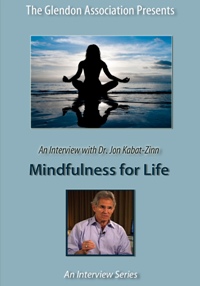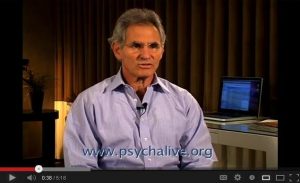Mindfulness – At Home in Our Skin
Watch and read an exclusive interview with Dr. Jon Kabat-Zinn.
We can be in touch through the five senses, and then it turns out that there are more than five senses. There’s the sense of proprioception, for instance. So awareness of the body in space. So right now, I can’t see my right hand. But I feel my hand. I know exactly where it is and I don’t know in a thinking way. I just know where my hand is. And if I put it here, I know – it looks strange, I know. But if I held a raisin in my hand and I wanted to pop it into my mouth, I could bring it around this way, I could bring it around this way. I could do it a million different ways and it comes right into the center. How does the body even know to move the arm like this? I’m not looking at the arm, I’m not thinking, “Do I contract the elbow? What do I do with my wrist?” Thought will get you nowhere with this. It’s a kind of wisdom of the body that does itself. So that’s the sense of proprioception.
Then there’s a sense of interaception. You get into the elevator and somebody says, “Hi. How are you?” And you say, “I’m fine.” How do you know that? Who told you you’re fine? Well, that’s the sense of interaception. By the way, this is all regulated by regions in the brain that are very, very active and dynamical. And very rapid. So you can kind of do a complete assessment of the body in one moment and, you know, and basically it’s an assessment of your organ systems. And all of the various, uh, systems within the body. Now, you may not be fine, but you’re not going to say that to the person in the elevator, so you just say, “Fine.” But the fact of the matter is when you inquire of yourself, “How am I?” there’s this sense. None – very few of us have actually ever developed it. These senses can be developed. Any sense can be refined. If you lose your sight, for instance, the sense of hearing and proprioception, where the body is in time and space can be highly developed. So Oliver Sachs wrote about a patient of his who was blind from birth. And so he had developed his other senses to the point where he could actually re-roof his house in the middle of the night because he didn’t have to see. It drove his neighbors crazy. But you can actually be on the roof without a sense of sight because you’ve developed and refined these other capacities. So mindfulness actually can allow us to be in touch, to come to our senses in, metaphorically and literally, with all of the senses we know, many of the senses that we don’t know. And it’s kind of like a discovery of the full dimensionality of the human repertoire. And what it offers is a kind of renaissance in your life.
It’s like waking up to how things actually are and realizing that it’s an incredible gift to have a body. We, say, “have a body.” And it’s like, “well, who has the body?” So that brings up the whole question of like, “Well, who am I anyway?” Which is another important aspect of mindfulness is to inquire in some sense as to whether we self-describe in ways that are adequate. A lot of us think of ourselves as quite diminished. And we don’t recognize the full dimensionality of our beauty. And, again, as we cultivate mindfulness, heartfulness, it’s kind of like, these aspects of our being get developed and we are more at home in our own skin, so to speak. And you can feel it. And it’s a lifetime’s engagement. It’s not like you just do it for eight weeks. That’s kind of like a launching platform. And you can do it in a lot of different ways. This is incredibly powerful stuff. But it does involve a discipline. It does involve a willingness to be fully present, no matter what the conditions are. Now, that’s hard. This is the hardest work in the world. But I would offer, well, okay, that’s true. But what else is there to do?
Order the Full DVD Interview:
 Mindfulness for Life: An Interview with Jon Kabat-Zinn
Mindfulness for Life: An Interview with Jon Kabat-Zinn
In this DVD, Dr. Jon Kabat-Zinn defines mindfulness as a way of “connecting to your life.” He discusses the “hard work” of living in the present moment, the personal and psychological impacts of developing a practice of mindfulness, and the benefits of utilizing mindfulness in therapy. He also touches upon mindfulness in parenting. Drawing upon his years of experience and research in the field of mindfulness, Dr. Kabat-Zinn offers an inspiring and instructive approach for mental health professionals and curious individuals alike.
Tags: comfortable in your skin, jon kabat-zinn, mindfulness, mindfulness meditation










Leave a Reply